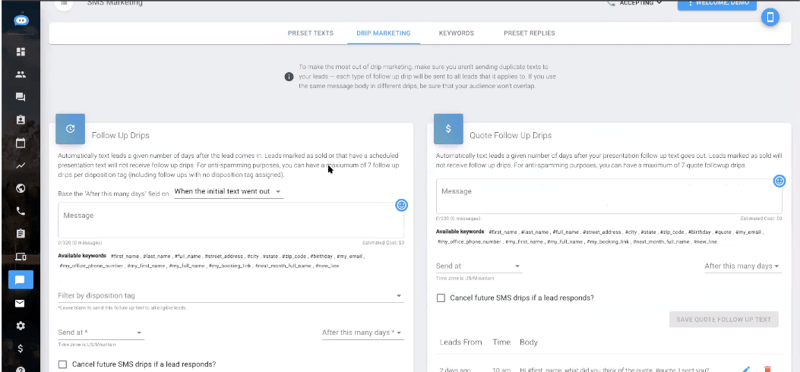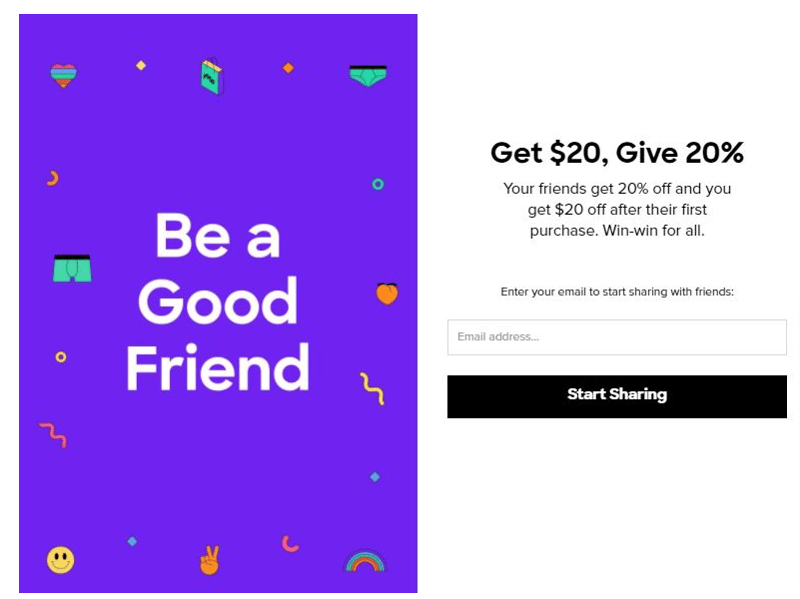
Top 9 CRM Marketing Strategies That Drive Results
 Updated on
Updated on
 By Bradley Kovacs
By Bradley Kovacs
Bradley Kovacs
Bradley has been passionate about technology since childhood, starting with Microsoft Flight Simulator at age six. In college, he automated his data e...
learn more
Bradley Kovacs
Bradley has been passionate about technology since childhood, starting with Microsoft Flight Simulator at age six. In college, he automated his data e...
Table of Contents
Table of Contents
In marketing, understanding your customers is key to all those campaigns, advertising, and dollars spent toward keeping current customers happy and gaining new ones.
What if you could eliminate the guesswork and get the cold, hard data on where your customers come from, how they behave, what moves them through your company’s purchasing funnel, and more? CRM marketing software lets you do that!
Instead of creating a customer persona (or personas) based on what you think your customers are like, you can create one based on what you know they are like.
Instead of creating campaigns that you think will resonate with your customers, you can create campaigns that you know will resonate with them (ok, at least have a WAY better chance at being successful, a marketing CRM won’t make you a mind reader).
Want to learn more? Want to know the ways of marketing CRM? Read on!
What is a Marketing CRM?
A Marketing CRM is a data-driven platform that helps marketers create meaningful customer relationships and improve their marketing strategies. CRM automation marketing aims to build personalized customer experiences by leveraging customer data, including past purchases, interests, and behaviors.
Marketers are focused on reaching target customers through campaigns like email, social media, and content to move customers through the buying process.
However, knowing the best channel for reaching high-quality leads and customers can be difficult at the best of times, especially if you don’t have an organized and clear view of who your customers are and how they respond to your attempts to reach them.
A marketing CRM helps marketers understand their customers and gives them the tools to execute strategies and tactics that reach them.
For example, drip campaigns or drip marketing allow you to send various marketing messages, from email to SMS, to customers at the right time.

Drip campaigns are typically set up in your CMS, allowing you to target a specific customer segment through email or SMS messages. Pretty handy for keeping your business at the front of your customer’s mind!
And drip campaigns are just one example of what a marketing CRM can do for you and your business. There are a lot more uses that align with the marketing goal of reaching your customers, which will be explained in more detail throughout this post.
Correlation Between CRM and Marketing
While the CRM tracks, manages, and stores customer data, marketing uses that data to create advertising, blogs, emails, SMS texts, business VoIP, and other communications to reach and convert more customers.
In today’s connected world, customers expect instant and consistent communication when they want it, and it’s up to marketers to provide it.
But if reaching customers properly means pushing relevant content their way, it’s tough to do that without a full understanding of who your customer is.
By using CRM strategies to track your customer journey through different sales funnels such as SEO and Social Media, you can gain invaluable knowledge about your customers' wants and needs.
You can then use this data to create meaningful customer personas that accurately reflect who you should target with your marketing campaigns - increasing engagement rates, building better relationships, and ultimately growing your business.
CRM Automation Marketing Explained
CRM automation marketing is an effective way to improve the customer experience and increase sales. It's an automated process that allows businesses to streamline their marketing, customer service, and other operational processes in one place.
With CRM automation marketing, you can create targeted campaigns, segment customers into different groups for better targeting, automate follow-up emails and messages, track customer interactions, and generate more leads.
Besides automation, marketing automation with CRM is about creating an experience for customers that will make them want to buy from you again and again. By automating processes, your business can focus on providing the best customer service and products possible without spending hours manually managing each task.
A few examples of CRM automation marketing include:
- Automated Email Campaigns: CRM marketing allows you to create highly personalized and targeted marketing experiences that drive conversions. Let’s say a potential customer downloads a white paper on your website. The CRM system automatically triggers an email sequence that keeps the potential customer engaged, provides valuable content, and ultimately positions your company as a trusted advisor, moving them closer to a buying decision.
- Personalized Content Recommendation Engines: Ever notice how streaming services suggest movies you might like based on your watch history? CRM systems can do the same for marketing content. An e-commerce store with a CRM can recommend products to customers based on their past purchases and browsing behavior.
- Dynamic Segmentation: CRM automation allows you to create flexible customer segments that automatically update based on customer behavior. Let's say you run a webinar series. Your CRM can segment your audience based on their interests.
- Tailored Ad Targeting: A CRM can integrate with social media advertising platforms to display targeted ads to website visitors who haven't converted yet. This could involve showcasing specific products they viewed on your site or promoting special offers relevant to their interests gleaned from their CRM profile.
These CRM strategies allow marketers to create a custom experience for each customer without manually researching and writing content for every user. By leveraging marketing automation with CRM, marketers can stay ahead of the curve and ensure their messages resonate with their target audiences.
Features and Benefits of CRM Marketing Software
Now that we have discussed the whys and hows of marketing CRM software, let’s move on to the specific features and benefits of marketing CRM software.
Since there are way too many features and benefits to discuss, the ones highlighted below are the top or main features, along with their benefits, that you should be aware of when considering CRM marketing software.
Examples of Marketing CRM features and benefits:
|
Feature |
Benefit(s) |
|
Lead management |
|
|
|
|
|
|
Analytics |
|
|
Accessibility |
|
|
Content management |
|
|
Segmentation |
|
|
Automating Marketing Processes with CRM
CRM shines when it comes to streamlining your marketing workflows. Here's how:
1. Streamlining Marketing Workflows with CRM Automation
CRM task automation allows you to automate repetitive tasks, freeing up your marketing team to focus on more strategic initiatives. This can include:
- Lead Scoring: CRM systems can assign scores to leads based on their engagement and demographics, helping you prioritize high-potential leads.
- Lead Nurturing: Develop automated email sequences that provide valuable content and nurture leads through the buyer's journey until they're sales-ready.
- Segmentation: Segment your customer base into targeted groups based on demographics, interests, and purchase behavior for more relevant marketing campaigns.
- Task Management: Automatically assign and track tasks for different marketing team members, ensuring no leads slip through the cracks.
2. Automating Email Marketing, Lead Nurturing, and Follow-Up Processes
CRM automation takes the manual effort out of email marketing, lead nurturing, and follow-up processes.
You can create personalized email templates with drag-and-drop builders, schedule automated email sequences based on lead behavior, and set up automated reminders for follow-up calls. This ensures timely communication and consistent messaging across all touchpoints.
3. Improving Efficiency and Scalability with CRM Automation Tools
By automating repetitive tasks, CRM marketing software empowers your marketing team to work smarter, not harder. This translates to:
- Increased Efficiency: Free up valuable time and resources for strategic marketing initiatives.
- Improved Scalability: Automate tasks to handle growing marketing needs without requiring additional personnel.
- Enhanced Data-Driven Marketing: Leverage customer data to personalize campaigns and optimize marketing ROI.
CRM Campaigns Techniques
At this point, you've moved from the basics of CRM automation marketing to more advanced techniques. Understanding the best practices for CRM campaigns is essential to getting the best results.
And the following are some techniques to get you started:
1. Customize and Streamline Your Email Marketing Strategies
By tailoring and optimizing email marketing strategies, businesses can target the right audience with the tailored message they need. This strategy gives companies a decisive advantage - automated emails personalized to customers' desires, likes, and interests.
Furthermore, with segmentation tools, marketers can easily break down customers into individual groups and hone in on each group's specific needs.
When you correctly identify and understand segments, you can craft tailored emails for each group. While crafting relevant emails for every customer can be time-consuming, automated emails simplify it. All you need is one quality template that you can easily customize to meet each client's needs.
2. Personalize Your Content for Each Segment
Leveraging segmented personalization empowers CRM marketing teams to understand their customer's unique interests better.
By creating materials tailored to each customer’s unique needs, businesses can build more meaningful relationships through engagement that is not only relevant but also deeply personal.
Personalized content allows companies to address customers’ concerns and highlight certain benefits or features of a product or service that interest them.
That's not all. Epsilon's research uncovered that 80% of consumers are more likely to buy from businesses that provide personalized recommendations based on prior purchases and interactions with the company. This research clearly illustrates the power of personalizing content for each segment.
3. Leverage Automation To Reach The Maximum Potential Of Your CRM
Utilizing marketing automation with CRM can help you achieve maximum sales outcomes while ensuring all necessary tasks are done promptly and efficiently.
Automation within your CRM system offers various opportunities, such as:
|
Features |
Description |
|
Data Collection & Organization |
Streamlines data collection and categorization, making it easier to track marketing activities. |
|
Lead Management & Segmentation |
Facilitates automated lead scoring and segmentation for more targeted, personalized campaigns. |
|
Campaigns & Communications |
Enables automated emails and other communications to ensure that prospects receive the right message at the right time. |
|
Analytics & Insights |
Provides detailed insights into customer behavior so you can make more informed marketing decisions. |
Findstack found that sales productivity can increase by an impressive 14.5% when companies use marketing automation with a customer relationship management (CRM) system. Incorporating CRM automation into your business will undoubtedly enhance its potential!
4. Analyze Customer Data and Optimize Campaigns According to the Results
By diving into customer data, you can uncover patterns and trends in their past that you can leverage to customize your marketing approach.
This technique involves gathering customer data from multiple sources, including surveys, purchases, website traffic data, social media activity, etc., and then analyzing it using analytics tools like segmentation or predictive analysis.
After identifying patterns and trends in customer data, you can adjust your CRM strategies to target leads better and drive higher conversion rates.
Top 9 CRM Marketing Strategies and Tactics
It isn’t just about sales and customer service. The data that your CRM collects about customers can help you formulate strategies that touch every aspect of marketing.
We already know that a CRM is essential to your marketing strategies and tactics, but let’s be honest: You’re here because you’re looking for ideas.
1. Boost Organic Content Marketing and SEO
CRM marketing isn't just about email automation and lead nurturing. It can be a powerful tool to enhance your organic content marketing strategy and search engine optimization (SEO) efforts. Here's how:
- Uncovering Hidden Keyword Opportunities: A CRM can analyze customer data from sources like emails, live chats, and support tickets. By identifying the language your customers naturally use when describing their problems or interests, you can discover valuable long-tail keywords that competitors haven't saturated.
- Optimizing for Rich Results: Your CRM can help you identify topics and keywords relevant to your audience by analyzing customer data. This empowers you to create targeted content optimized for rich search results, increasing your website's visibility.
- Targeting Customer Search Queries: A CRM that integrates with SEO tools can analyze customer interactions to identify the specific keywords, phrases, and topics your target audience is actively searching for online. This allows you to tailor your website content and messaging to directly address their needs and search intent.
- Enhancing Technical SEO: Many CRMs integrate with technical SEO auditing tools, saving you time and effort. These tools can identify areas for improvement on your website, such as broken links or slow loading times, allowing you to improve your site's search engine ranking.
2. Pay Per Click (PPC) Marketing
Similar to search engine optimization, understanding which words and phrases your customers use in searches can help you better target your pay-per-click advertising efforts. Yes, it’s important to bid on branded keywords at the very least, but you can gain a lot of traffic in a short amount of time if you bid on the right keywords.
Like organic SEO, CRM integration with keyword tracking and measuring tools can help you strike gold with keyword bidding.
3. Email Marketing

Imagine having email management software where you’ve painstakingly created segments and rules to manage your contact list. However, you still get daily emails from frustrated customers who are receiving communications they shouldn’t be (e.g. sending an English email to a French customer).
With CRM integration, your email lists can be updated automatically when customer data is added, updated, or changed (avoiding frustrated customers hitting the unsubscribe button), and you can also schedule certain communications to be sent at the right times.
You can also use A/B testing (also known as split testing) to compare two versions of a campaign with different elements to discover which performs better in terms of engagement or conversion rate.
It involves taking two versions of a page or element within a page (A and B) and sending them out simultaneously to different audiences to compare which version gets a better response.
Companies use A/B testing for everything from email subject lines or CTA buttons to website design elements such as font size and color schemes.
By measuring each element's performance against key metrics like click-through rate (CTR), time spent on page (TSP), or bounce rate (BR), companies can determine what works best for their audience and optimize future campaigns accordingly.
4. Social Media Marketing
Psst. If you aren’t already using a social media management system to create, schedule, and publish social media posts and ads, you’re missing out.
Taking a social media management system and integrating it with a CRM just takes everything to the next level:
- Customer data can show you which social media channels to target. For example, if your sales team sees that the majority of qualified leads are coming from Facebook, you can focus more on creating content for your Facebook audience.
- You can get a bird’s-eye view of what your company’s reputation is online
- Incoming comments and messages go to one inbox for easy management
- Track the performance of campaigns and advertising easily
Social listening
Most social media management systems have a cool feature called social listening. Social listening allows you to track hashtags, keywords, and even specific social media accounts so you can have a pulse on what your customers are talking about. Social listening can be a very useful feature to help you create customer personas, marketing strategies, and understand your company’s overall reputation online.
5. Account-Based Marketing
When marketing and sales work together on a growth strategy to create personalized buying experiences for specific customer accounts, that’s account-based marketing.
Your CRM is the main tool for account-based marketing because it holds all the information you need about the specific account you want to target. Now you can examine that customer more closely and create a personalized experience that will resonate with them. See how having everything in one place makes such a difference?
Here are some quick strategies for account-based marketing:
Personalized email campaigns
Let’s say you have customers in the construction industry that you haven’t marketed to in a while. Since your CRM has already segmented those customers into a category based on industry, why not send them a personalized email campaign to spark interest in your company?
Follow specific social media accounts
Do you see your customers interacting with a specific social media account? If so, it might be a good idea to follow that account and note what terminology and jargon they use, what topics they talk about, and who interacts with them.
6. Referral Programs
Word of mouth is great for marketing, so it’s no surprise that companies use referral programs to entice their existing customers to recommend products and services to their friends and family. Referral programs are a winning marketing strategy that top eCommerce companies use all the time to gain new customers.
Referral programs can work in a variety of different ways, from giving existing customers coupons or discount codes that they can forward to friends and family through email or social media. You’ve probably received an email or DM from a friend with a good discount for a product or service and decided to buy based on that referral.
Here’s an example of an effective referral program from MeUndies:

As you can see, they’ve made their referral program straightforward to use. What most likely happens here is that someone enters their email address, and the CRM automatically triggers a referral email to be sent, which the customer can then forward to whomever they want.
With a CRM’s automation and ability to segment customers, you can set up a referral program that works for your business and sit back and watch as the number of new customers grows.
7. Event Marketing
Whether an event is in-person or virtual, the ability to gather data related to it is crucial for effective marketing. Not all CRMs have robust event marketing tools built-in, but thankfully, event software integrations are available most of the time.
With a CRM behind the scenes of your event marketing, you can gather valuable data like registration numbers (even if people register from different sources), attendee information, website clicks, and more.
8. Conversational Marketing
Conversational marketing is meant to encourage dialogue with customers quickly so that questions can be answered, issues can be solved, and anything preventing them from moving forward in the sales funnel can be eliminated.
Chatbots on websites are one example of conversational marketing. 45% of businesses use chatbots on their website, with that number growing daily. The idea with chatbots is to facilitate real conversations with customers to create a personalized and effective experience for them so an issue can be solved as quickly as possible, whenever the customer needs it—even if they need support outside of customer service hours.
9. Business SMS

Business SMS or business text messaging allows you to gain more touchpoints with customers or leads, thus increasing the chance of a sale.
Similar to email marketing, your CRM can automate messages to be sent to specific customers at specific times to keep them interested and engaged. For example, you could send a discount code to a customer when they pass your business’s brick-and-mortar location. You can also create and save templates that can be personalized for each customer.
Some CRMs even allow for automated text responses, so when a customer messages with a specific sentence or keyword, an automated response is triggered. Automated responses are useful for booking and confirming appointments, confirming receipt of a package, and more. They can save your customer support and sales teams time while still moving customers through the sales or support process.
CRM Marketing Examples
Beyond streamlining marketing workflows, CRM systems offer a wealth of functionalities that can enhance your overall customer relationship strategy. Here are a few examples of how CRM marketing can be leveraged to build stronger relationships:
1. Automated Feedback Collection
Gathering customer feedback is crucial for understanding their needs and improving your offerings. CRM automation can simplify this process:
- Automated Surveys: Trigger email or SMS surveys after key customer interactions, such as a purchase or service experience. This allows you to capture fresh feedback while the customer is still thinking about the experience.
- Sentiment Analysis: Integrate sentiment analysis tools with your CRM to analyze customer reviews, social media mentions, and support tickets. This can help you identify areas of improvement and proactively address customer concerns.
2. Automated Customer Support
CRM systems can automate basic customer support tasks, freeing up your team to handle complex issues:
- Chatbots: Implement AI-powered chatbots on your website or social media channels to answer frequently asked questions or provide initial troubleshooting steps.
- Automated Ticketing: Route customer inquiries to the appropriate support agents based on the issue and automatically generate tickets for tracking and resolution.
3. Omnichannel Service
Customers expect a seamless experience across all touchpoints. CRM marketing helps you deliver omnichannel service:
- Unified Customer History: Within your CRM, provide a unified view of all customer interactions across different channels (phone, email, social media). This empowers support agents to personalize their responses and resolve issues efficiently.
- Seamless Communication: Allow customer support agents to seamlessly switch between communication channels within the same support thread. This will eliminate frustration and ensure a smooth resolution process.
4. Strong Social Media Presence
CRM marketing can enhance your social media strategy:
- Social Media Listening: Use CRM tools to monitor social media conversations and identify brand mentions, customer sentiment, and emerging trends.
- Targeted Social Media Engagement: Engage with followers in a personalized way by referencing their past interactions or purchase history.
- Social CRM Integration: Integrate your CRM with social media platforms to streamline social media marketing efforts and gain valuable customer insights directly from social media interactions.
Summary
We all want to understand our customers better. This not only helps you help them, but it also increases your sales. After all, a company's reputation helps with brand recognition and positively impacts the company’s bottom line.
Marketing CRMs give you many tools and insights into your customers and prospects to enhance your understanding of how they move through the purchasing process, what support they need, and more.
A marketing CRM can help you with every aspect of your marketing, from content marketing to events to paid advertising.
In short, a marketing CRM gives you a bird' s-eye view of your customers, allowing you to tailor your marketing efforts to reach them more effectively. Book a demo with Ringy today to see how we can help you do exactly that.

Skyrocket your sales with the CRM that does it all.
Calling? Check. SMS? Check. Automation and AI? Check. Effortlessly keep in touch with your customers and boost your revenue without limits.

Take your sales to new heights with Ringy.
Sales in a slump? Ringy gives you the tools and flexibility you need to capture leads, engage with them, and turn them into customers.
Subscribe to Our Blog
Enter your email to get the latest updates sent straight to your inbox!
Categories
Related Articles




































































































